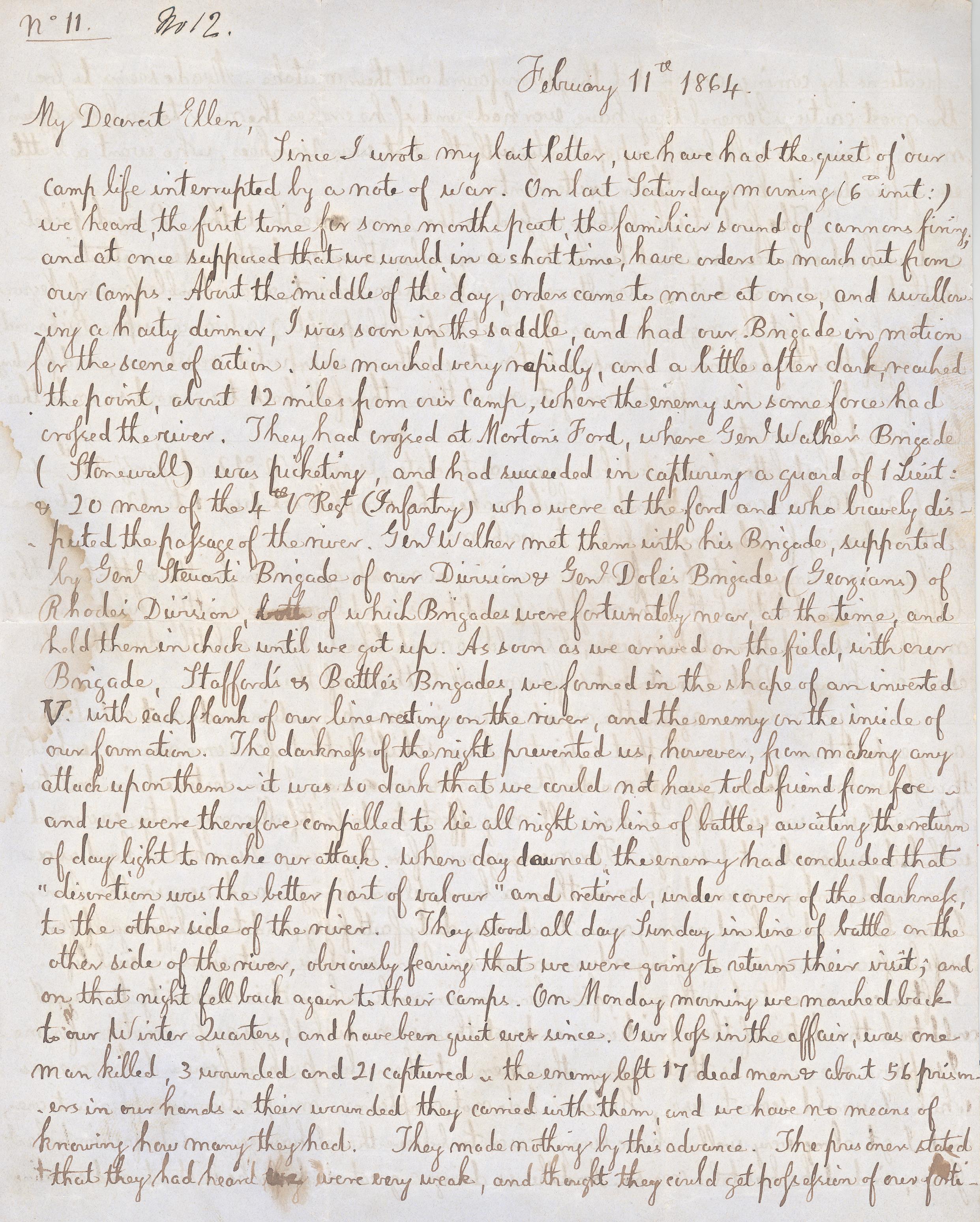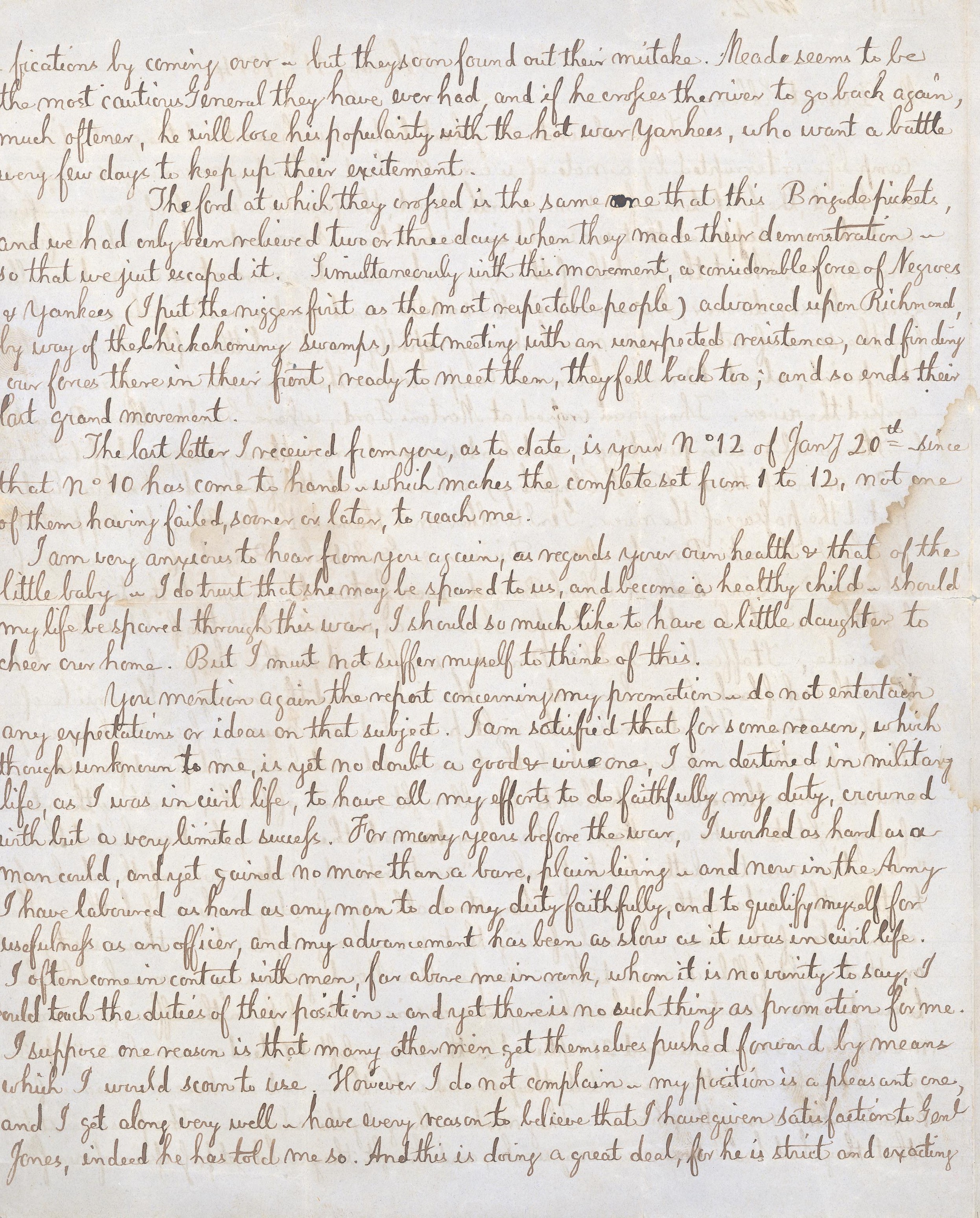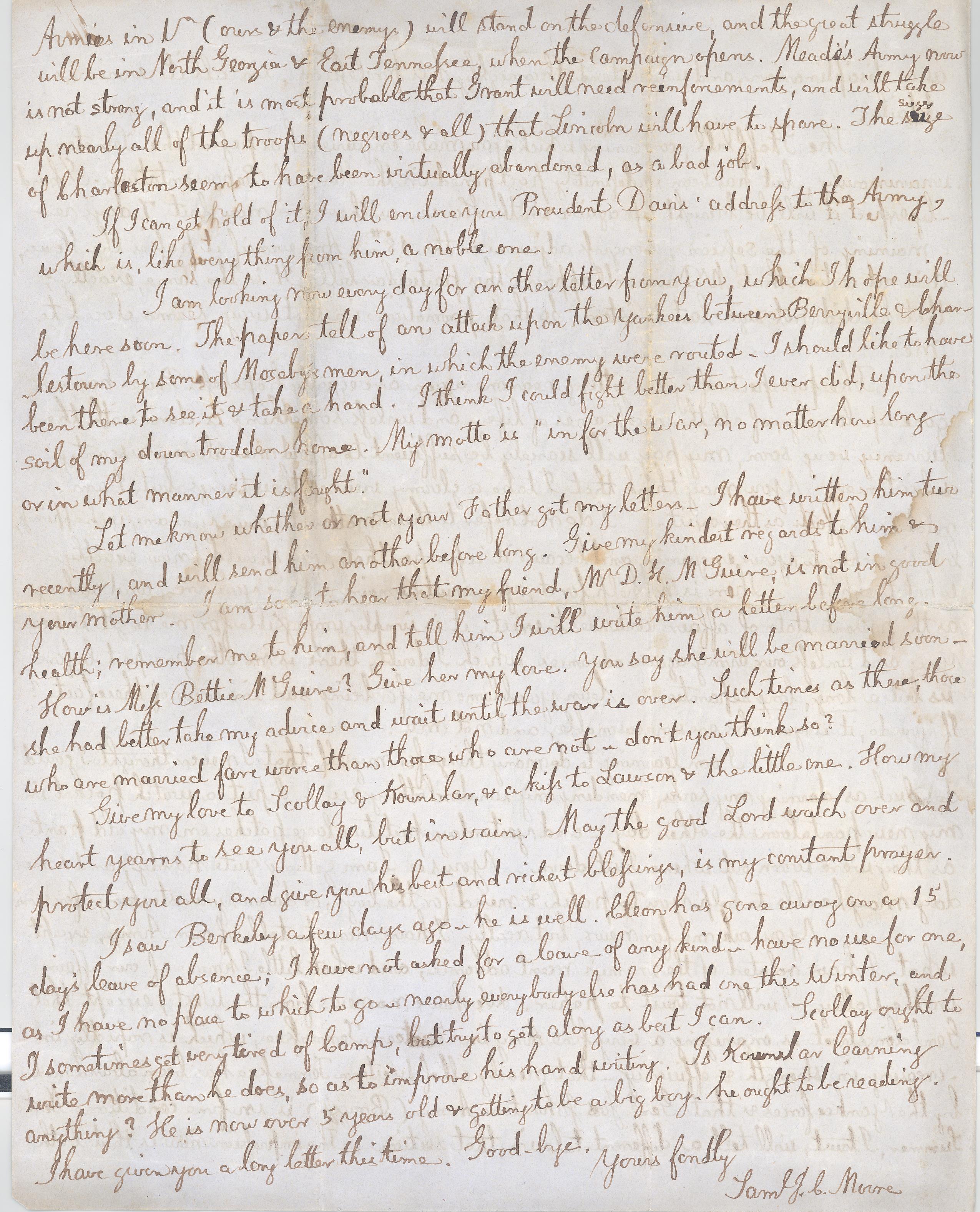Item Description: Letter dated 11 February 1864, from Samuel J. C. Moore to his wife, Ellen, describing a skirmish at Morton’s Ford on the Rapidan River. Samuel J. C. Moore, lawyer and planter of Berryville, Clarke County, Va., was an officer with the 2nd Virginia Infantry Regiment (2nd Regiment Virginia Volunteers) and adjutant to Jubal Early during the Civil War. His wife Ellen Moore remained in Berryville during the conflict.
Item Citation: Letter dated 11 February 1864, in the Samuel J. C. Moore Papers #4618, Southern Historical Collection, Wilson Library, University of North Carolina at Chapel Hill.
Item Transcription:
February 11th 1864
My Dearest Ellen,
Since I wrote my last letter, we have had the quiet of our camp life interrupted by a note of war. On last Saturday morning (6th init:) we heard, the first time for some month past the familiar sound of cannons firing; and at once supposed that we would in a short time, have orders to march out from our camps. About the middle of the day, orders came to move at once, and swallowing a hasty dinner, I was soon in the saddle, and had our Brigade in motion for the scene of action. We marched very rapidly, and a little after dark, reached the point, about 12 miles from our camp, where the enemy in some force has crossed the river. They had crossed at Morton’s Ford, where Genl Walker’s Brigade (Stonewall) was picketing, and had succeeded in capturing a guard of 1 Lieut: & 20 men of the 4th V Regt (Infantry) who were at the ford and who bravely disputed the passage of the river. Genl Walker met them with his Brigade (Georgians) of Rhodes’ Division, both of which Brigades were fortunately near, at the time and hold them in check until we got up. As soon as we arrived on the field, with our Brigade, Stafford’s & Battle’s Brigades, we formed in the shape of an inverted V with each flank of our line resting on the river, and the enemy in the inside of our formation. The darkness of the night prevented us, however, from making any attack upon them as it was so dark that we could not have told friend from foe and we were therefore compelled to lie all night in line of battle, awaiting the return of day light to make our attack. When day dawned the enemy had concluded that “discretion was the better part of valour” and retired, under cover of the darkness, to the other side of the river. They stood all day Sunday in line of battle on the other side of the river, obviously fearing that we were going to return their visit; and on that night fell back again to their camps. On Monday morning we marched back to our Winter Quarters, and have been quiet ever since. Our loss in the affair, was one man killed, 3 wounded and 21 captured, the enemy left 17 dead men & about 56 prisoners in our hands, their wounded they carried with them, and we have no means of knowing how many they had. They made nothing by this advance. The prisoners stated that they had heard we were very weak, and thought they could get possession of our fortifications by coming over, but they soon found out their mistake. Meade seems to be the most cautious General they have ever had and if he crosses the river to go back again, much oftener, he will lose his popularity with the hot war Yankees, who want a battle every few days to keep up their excitement.
The ford at which they crossed is the same one that this Brigade pickets, and we had only been relieved two or three days when they made their demonstration so that we just escaped it. Simultaneously with this moment, a considerable force of Negroes & Yankees (I put the niggers first as the most respectable people) advanced upon Richmond, by way of the Chickahominy swamps, but meeting with an unexpected resistance, and finding our forces there in their front, ready to meet them, they fell back too; and so ends their last grand movement.
The last letter I received from you, as to date, is your No. 12 of Jany 20th since that No. 10 has come to hand which makes the complete set from 1 to 12, not one of them having failed, sooner or later to reach me.
I am very anxious to hear from you again, as regards your own health & that of the little baby. I do trust that she may be spared to us, and become a healthy child, should my life be spared through this war, I should so much like to have a little daughter to cheer our home. But I must not suffer myself to think of this.
You mention again the report concerning my promotion, do not entertain any expectations or ideas on that subject. I am satisfied that for some reason, which through unknown to me, is yet no doubt a good & wise one. I am destined in military life, as I was in civil life, to have all my efforts to do faithfully my duty, crowned with but a very limited success. For many years before the war, I worked as hard as a man could, and yet gained no more than a bare, plain living and new in the Army I have labored as hard as any man to do my duty faithfully, and to qualify myself for usefulness as an officer, and my advancement had been as slow as it was in civil life. I often come in contact with men, far above me in rank, whom it is no vanity to say, I could teach the duties of their positions and yet there is no such thing as promotion for me. I suppose one reason is that many other men get themselves pushed forward by means which I would scorn to use. However I do not complain as my position is a pleasant one, and I get along very well, have every reason to believe that I have given satisfaction to Genl Jones, indeed he has told me so. And this is doing a great deal, for he is strict and exacting as a disciplinarian, and understands thoroughly his profession, in all its various details.
The Staff bill, concerning which you make enquiries, has passed the Senate unanimously, but has been indefinitely postponed in the House of Representatives. I hardly expect it will be brought up again in the House, as there are now but 7 days remaining of the session; Congress adjourns on the 18th: And even if it passes the House, it is not certain that [?] Davis will approve this particular bill. It is the same exactly, that he did not sign last Winter. So that promotion in that way, seems closed to me.
The prospects of your getting near me again are equally hopeless. Prices have gone up largely, of all the necessaries of life and unless something is done with the currency very soon, my pay will scarcely be sufficient to afford me, alone, a scanty subsistence. You may think that I take a gloomy view of these things, but I am relating the facts as they exist. I do not refer to the matter to cause you any unhappiness, but in reply to your enquiries, and because it is proper that you should know exactly what to expect. There is no help for it, you must remain where you are, and as long as the present state of affairs continues to exist, it is simply impossible for me to get to see you; and unless our army again advances, which I doubt, there is no other prospect before us but a long, long separation. Can you blame me for being sad in view of these facts? If you do, it is you who are unreasonable and not me.
I am learning to do many things for myself that I never thought I could do: Such as darning my socks, mending my underclothing – I put a watch pocket in my new pantaloons the other day – and yesterday put two large patches in my old pants, as they were worn out where I sit down. You see I am getting quite handy and some day may be able to help you to patch & mend for the boys, or darn your stockings for you.
You ask me for news, but really I have none to tell of our Army, except what I have related of the enemy’s recent advance; and what little I know of our affairs in the Valley, I will not trust to paper. We have no news from the West, except that Genl Longstreet is organizing a very fine Army in Eastern Tennessee, which is rapidly increasing in strength & efficiency that nearly all of Western Tennessee has been abandoned by the Yankees & that Genl Jo Johnston’s Army (Bragg’s) is in fine condition. Next Summer, I trust, will tell a different tale in that section. The impression now is that both Armies in Va (ours and the enemy) will stand on the defensive, and the great struggle will be in North Georgia & East Tennessee when the campaign opens. Meade’s Army is not strong, and it is most probable that Grant will need reinforcements, and will take up nearly all of the troops (negroes + all) that Lincoln will have to spare. The siege of Charleston seems to have been virtually abandoned, as a bad job.
If I can get hold of it, I will enclose you President Davis’ address to the Army, which is, like everything from him, a noble one.
I am looking now every day for another letter from you, which I hope will be here soon. The papers tell of an attack upon the Yankees between Berryville & Charleston by some of Mosely’s men, in which the enemy were routed. I should like to have been there to see it & take a hand. I think I could fight better than I ever did, upon the soil of my downtrodden home. My motto is “in for the War, no matter how long or in what manner it is fought.”
Let me know whether or not your Father got my letters. I have written him two recently, and will send him another before long. Give my kindest regards to him & your mother. I am sorry to hear that my friend, W D McGuire is not in good health; remember me to him, and tell him I will write him a letter before long. How is Miss Bettie McGuire? Give her my love. You say she will be married soon – she had better take my advice and wait until the war is over. Such times as these, those who are married fare worse than those who are not, don’t you think so?
Give my love to Scolley & Kownslar & a kiss to Lawson & the little one. How my heart yearns to see you all, and give you his best and richest blessings, is my constant prayer.
I saw Berkeley a few days ago, he is well. Cleon has gone away on a 15 days leave of absence; I have not asked for a leave of any kind, have no use for one, as I have no place to which to go. Nearly everybody else has had one this Winter, and I sometimes get very tired of Camp, but try to get along as best I can. Scolley ought to write more that he does, so as to improve his handwriting. Is Kownslar learning anything? He is now over 5 years old & getting to be a big boy. He ought to be reading. I have given you a long letter this time. Good-bye.
Yours fondly
Sam J. C. Moore





